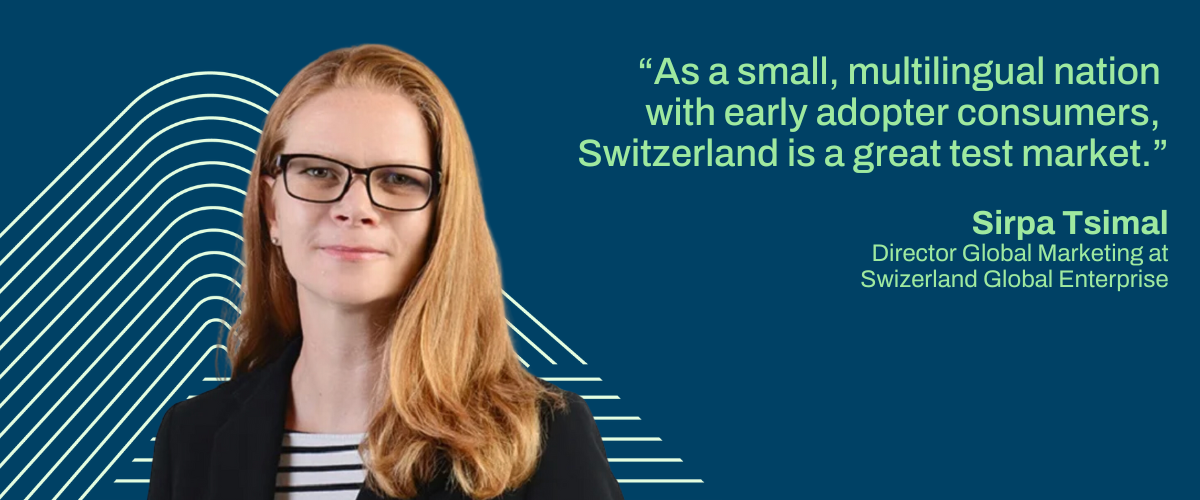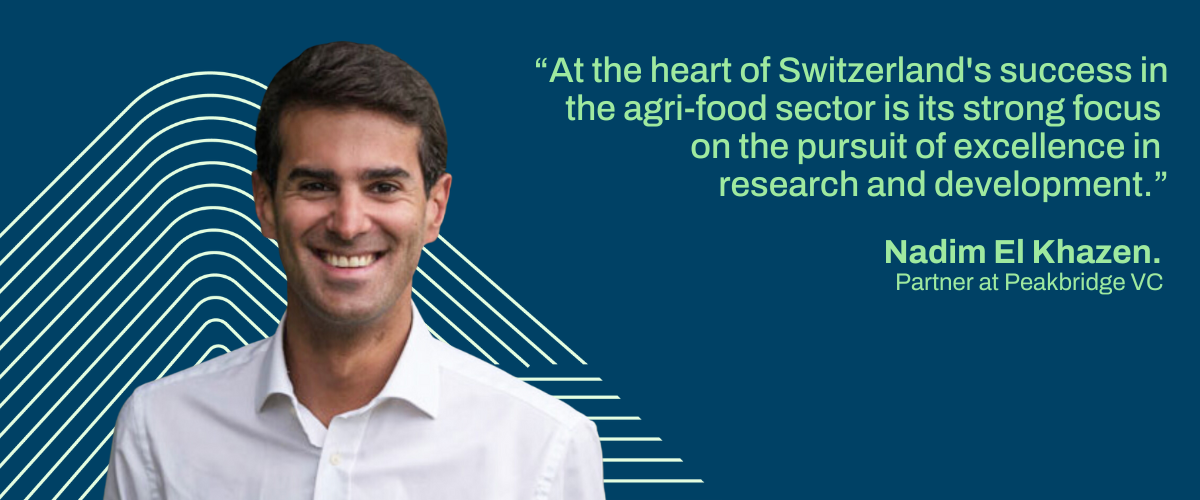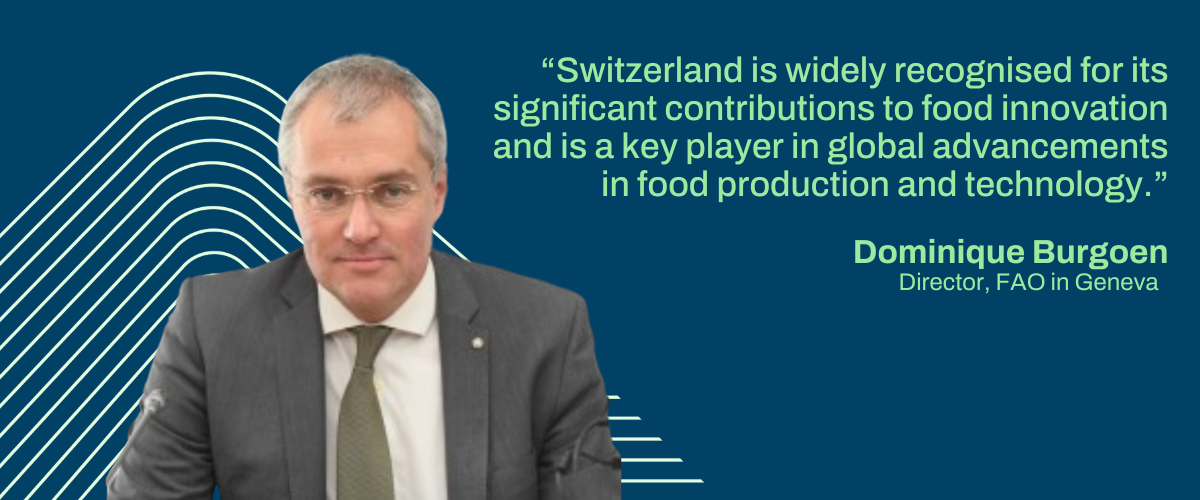Can food be healthy, tasty – and...
Switzerland: small country, big food nation
Switzerland: small country, big food nation

What does it mean to be a food nation? We caught up with experts from Switzerland Global Enterprise, PeakBridge VC and the Food and Agriculture Organization and to explore what Switzerland has to offer on the global stage.
The phrase “food nation” has made a number of appearances in the last few years. In Denmark, it’s the name of a non-profit public-private partnership that raises awareness of the country’s role in shaping a more sustainable and innovative food future. In Scotland and in Norway, it’s been used in key policy documents that set out a vision for a healthier, and more equitable food system that creates the basis for growth and value creation throughout the country.
For us, being a food nation is about committing, as an ecosystem, to collaborate to drive healthier, future-proof food systems that benefit people and planet. It’s about bringing together our world class food innovators to pool our knowledge and expertise and co-create and develop joint Impact Projects. It’s about consciously building the infrastructure needed to facilitate innovation. And, given that the global goals for food system transformation are too complex for any one country to tackle alone, it’s about drawing on synergies with other food nations so we can play to our respective strengths and move the needle faster.
To do this effectively, we need to understand which ingredients make up Switzerland’s recipe for success. The interviews below highlight our strategic location, the strength of our research and development activities, the density, breadth and collaborative nature of our ecosystem and our ability to transform cutting-edge technology into solid, science-backed startups that are reshaping the future of food production, from farm to fork to waste.
We believe that these qualities will enable us to carve out a space as a scale-up nation – moving beyond identifying the problem and developing the solutions to accelerating the widespread implementation of the technologies and approaches that will bring the future of food a step closer.
Sirpa Tsimal
Switzerland Global Enterprise

We imagine that foodtech startups often ask you “why Switzerland?”. What do you tell them?
Of course, there’s no single answer because the benefits will be unique to each company’s needs. But I always find that Switzerland’s strategic location at the centre of Europe is a great place to start. Swiss FoodTech companies can leverage this geographical advantage to expand their reach and tap into a global market.
As a small, multilingual nation with early adopter consumers, Switzerland is also a great test market. Not many people know this, but Starbucks actually tested their first coffee shop in Zurich before rolling out across Europe. Consumers in Switzerland are willing to pay a premium for organic and sustainably produced food. So businesses that focus on sustainable sourcing, eco-friendly packaging, and transparent supply chains can definitely find a receptive test market here.
At S-GE’s recent Investment Summit, you talked about the importance of ecosystems. Can you tell us more about how you see Switzerland’s food innovation ecosystem supporting companies that are looking to scale?
Yes, we believe that pooling our knowledge and resources across the ecosystem is vital and collaboration is a key part of Switzerland’s USP. We’re home to a huge range of large food enterprises including Nestlé, Givaudan, dsm-firmenich, and Bühler, providing FoodTech scale-ups with valuable access to expertise and potential joint projects and business collaborations. We have retailers like ALDI SUISSE who are open to putting startup innovations on their shelves and leading universities and companies that are willing to make their facilities available to innovators who need to scale but can’t yet afford to make capital investments.
How do you and your colleagues play a role in helping to lift Switzerland as a food nation on the global stage?
To have all of these factors combined in one place is an incredible asset. We see it as our job to build on these foundations, connect all the players within the network and ensure that Switzerland is able to maximise its global contribution. We do that by interacting with the right people at the right time and ensuring that our story is in the minds of the most important players in the ecosystem. This might be through our global PR work or by co-creating content within our network and together with our regional and cantonal partner organisations. Collaboration – like our partnership with the Swiss Food & Nutrition Valley – is very important to us.
Nadim El Khazen
PeakBridge VC

As an investor, what would you say is the key factor behind Switzerland’s success when it comes to agri-food innovation?
I would say its strong focus on the pursuit of excellence in research and development. This is driven by a growing number of start-ups that have spun off from the country’s leading universities, such as EPFL in Lausanne and ETH in Zurich. These academic institutions have become true breeding grounds for cutting-edge technologies that are reshaping the future of food production, from farm to fork to waste.
Swiss universities and research institutions collaborate closely with the private sector to pioneer breakthroughs in ingredients innovation, alternative proteins, digitalisation of food chains, water technology, nutrition & health and new farming systems – all of which have profound implications for the global agri-food landscape.
Could you share some examples of innovative technologies and startups in Switzerland that PeakBridge is currently focusing on and investing in?
At PeakBridge – a VC and growth investment fund – we focus on scalable proprietary B2B agri-food technologies. In the field of water technology, Swiss start-ups are developing innovative solutions to address the pressing challenges of mineral water scarcity, quality and the significant carbon footprint of single-use packaging and transportation. In fact, a company like BE WTR from Lausanne has emerged as one of the global disruptors of water distribution.
In nutrition and health, Swiss innovators are at the forefront of creating personalised and functional foods that cater to individual health needs. Through the intersection of biotechnology and nutrition, we see great innovation emerging in two segments: the first one is personalised nutrition and the influence of food on physical and mental health. The second is the use of fermentation to create new fats and proteins which can be analogs or identical to nature but always animal-free.
As food security and the re-localisation of food and water production is on top of governments agendas, Switzerland stands as one of the leading contributors to excellence and innovation in those technologies that will reshape the future of food production and consumption.
Dominique Burgeon
FAO Office in Geneva

Switzerland is often regarded as a leader in food innovation. How does the FAO view Switzerland’s contributions to global advancements in food production and technology?
Switzerland is widely recognized for its significant contributions to food innovation and is a key player in global advancements in food production and technology. Ranking as the fifth-largest country in terms of research and development activities and hosting major national corporations with global influence, Swiss-based companies play a crucial role in disseminating innovation and technology worldwide.
Switzerland boasts a thriving ecosystem of startups alongside multinational corporations and benefits from its leading technical universities and come up with solutions which could address several challenges regarding food, nutrition, and production in the future. The government actively supports and encourages this innovative environment.
Finally, we’ve also observed a strong emphasis on research and development related to water. Many Swiss companies are leading innovations in clean drinking water, sanitation, and irrigation. These advancements don’t only benefit Switzerland but also have the potential to make a substantial impact in developing countries, ensuring access to clean water and enhancing water productivity in agriculture.
What specific initiatives or programs has the FAO collaborated on with Switzerland to promote sustainable agriculture and food innovation, both within the country and internationally?
FAO has engaged in several important collaborations with Switzerland to advance sustainable agriculture and food innovation, both domestically and internationally. There are, for example, Memoranda of Understanding (MoUs) with Swiss companies and associations aimed at enhancing the transformation of agrifood systems within the private sector. One noteworthy collaboration is with the Kuehne Foundation, which has provided crucial logistical support, knowledge transfer, and training for various agricultural initiatives. This support extends to field operations and logistics management in challenging environments. FAO also has an agreement with SIPPO, the Swiss Import Promotion Programme, to integrate developing and transition countries into world trade.
FAO is now looking to intensify its collaboration with the Swiss private sector to bolster sustainable agriculture and food innovation initiatives. FAO Members have developed a new private sector engagement strategy and, in line with this commitment, Deputy Director-General Beth Bechdol met with private sector representatives earlier this year. We now have a dedicated private sector expert at the FAO Liaison Office in Geneva to facilitate and strengthen ongoing engagement with the private sector, ensuring that these partnerships continue to evolve and contribute effectively to our work around sustainable agriculture and food innovation. And of course, the FAO also cooperates very closely with the Swiss government, both to strengthen relations with the Swiss business sector, as well as in many other programmatic areas.
What role do you see the Swiss private sector playing in supporting the FAO to achieve its objectives?
We see the Swiss private sector potentially playing a multifaceted and vital role in supporting FAO in achieving its objectives across the agrifood system. One key area of collaboration is in nutrition, where several Swiss companies are actively developing solutions to enhance the nutritional content of food, particularly for vulnerable populations. Many companies are also pioneering other initiatives to contribute to more balanced and sustainable diets by, for example, developing plant-based meat alternatives.
When it comes to technology, Swiss businesses contribute to soil preservation and improved agricultural practices through, for example, advanced technologies in soil mapping. This facilitates precision agriculture and more efficient water management. We see this work complementing FAO’s capabilities in geospatial data and in-country resources and aim to foster productive partnerships between Swiss initiatives, FAO and its Members to deliver our shared development objectives.
Switzerland is also home to numerous multinational corporations that play a crucial role in global food production and distribution. For instance, some companies excel in optimising food packaging, particularly for beverages, ensuring product quality and food safety, which aligns with FAO’s efforts to enhance food preservation and quality while minimising contamination risks.
Lastly, Switzerland is a major hub for coffee trade. Approximately 50 percent of the world’s coffee trade flows through Switzerland, and a thriving manufacturing industry makes Switzerland one of the top five coffee exporters globally for finished products by value. This fact alone has far-reaching implications as Swiss companies are essential partners for coffee growers in developing countries. Several players in the coffee value chain are vocal about their commitment to sustainable and equitable value chains, which underscores the importance of stable production and sustainability for the future.
The Swiss private sector’s diverse contributions to agrifood systems transformation present abundant opportunities for continued collaboration – and we look forward to working alongside with the Valley team and industry partners to make this happen.
Never miss a Swiss food innovation morsel.
Latest News
Jerome Barra: “Can food be healthy, tasty – and sustainable?”
Bühler names two Fellows for advancing sustainability and technological innovation
Bühler has named Béatrice Conde-Petit,...
Yumame Foods x Agilery: Laying the foundations to make fermented foods the star of the plate
Valley partner Yumame Foods...
FOOD2050 teams up with PAN International to advance the Planetary Health Diet from science to the serving line
Valley partner FOOD2050 has partnered...





